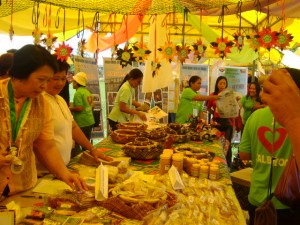
Experiencing abuse at the hands of someone who vowed to love and cherish you is a nightmare for any woman. Often, the road to recovery and the healing process take a long time, the pain buried deep inside one’s heart.
Lily, 42, from Ormoc City, Leyte, is a battered wife. She endured the physical and emotional abuse of her estranged husband, Mario, for the sake of keeping their family together. However, things became worse when Mario started having an affair with a 23 year-old woman, neglecting his family even more.
Lily narrated that she was a plain housewife, thus, financially dependent on her husband, a skilled worker of a big company. When the company went through retrenchment, Mario received his separation pay amounting to close to two million pesos. “With this amount, our family could have started anew, but my husband spent all his money on his mistress,” she related.
The last straw was when Mario arrived home one day and threw a big kerosene lamp on Lily, who fortunately escaped harm.
Starting anew, singlehandedly
With the help of the Local Social Welfare and Development Office and the Department of Social Welfare and Development (DSWD) Field Office VIII, Lily went through counseling sessions and filed a case against her former husband citing RA 9262 or Anti-Violence Against Women and their Children Act.
Being a solo parent was very hard for Lily, jobless with four children to take care of. Her determination paid off when she was hired as a storekeeper in their locality, receiving a daily wage of P120.00.
Then, she became a member of a livelihood group, with other abused women from their community under the DSWD’s Self – Employment Assistance – Kaunlaran (SEA-K) program. Through the program, Lily and the other members of the group received an interest–free loan of P10, 000.00 each from the DSWD. The program also accesses beneficiaries to microfinance facilities and institutions for vocational and life-changing skills training provided by the DSWD and the local government unit.
“I began to realize my worth as a woman and observant of my personal rights, to be treated with respect and dignity. “Di ako uurong “(I won’t withdraw), “Lily emphasized referring to the legal case she filed against her husband.
Determined to succeed, Lily started retailing rice in the neighborhood where she lives. Lily bought sacks of rice and a weighing scale. She profits more than a hundred pesos for each sack.
Further, Lily also attended the training on flower making, as well as crafting personal and house accessories from recycled paper. Soon, she excelled in her craft. On Saturdays and Sundays, Lily worked on her collection, made of used tetra packs, which she finds in her neighborhood.
To help Lily market her wares, the DSWD invited her group to participate in trade fairs during special events, such as the Department’s anniversary and the National Women’s Month.
With her determination, Lily’s transformation was short and easy. Rather than dwelling on her traumatic past, she chose to let go of the pain and move on to a productive, happier life with her children.
Domestic Violence
Based on the data of the Philippine Commission on Women (PCW) and the Philippine National Police (PNP), the number of reported VAW cases increased from 218 in 2004 to 11,531 in 2012. The 2012 report is so far the highest number of reported VAW cases since 1997.
Social Welfare and Development Secretary Corazon Juliano Soliman said that there must be strengthening of awareness to women’s rights as specified in RA 9262 that urged the women to break their silence and should report their cases to authorities.
Among the different regions, Region 6 (Western Visayas) posted the highest reported VAW cases from January to December 2012 with 3,211 reported cases, accounting for 20.1 percent of the total reported VAW cases nationwide. Region 11 (Davao) comes next at 3,102 (19.4%) reported VAW cases followed by Region 7 (Central Visayas) with 2,035 reported VAW cases or 12.7 percent of the total reported VAW cases nationwide, the PNP report cited.
Aside from the livelihood assistance given to victims of domestic violence like Lily, the DSWD also provides center-based and community-based programs and services. These include counseling sessions, temporary shelter, medical and psychological services, self-enhancement, skills development, legal assistance in coordination with the Department of Justice and Commission on Human Rights, referral to other government organizations and non-government organizations (NGOs) and other service providers.
The DSWD continues to work closely with local government units, NGOs and other stakeholders in implementing protective and rehabilitative programs and services for abused women.
“With the provisions of RA 9262 firmly in place, we are hoping that the incidence of domestic violence will decrease in the coming years. The DSWD is also implementing programs to prevent domestic violence such as the Community-Based Rehabilitation Program for Perpetrators of Domestic Violence, partnership with other agencies to prevent domestic violence, Empowerment and Reaffirmation of Paternal Abilities Program (ERPAT), and the Family Development Sessions (FDS) for Pantawid Pamilyang Pilipino beneficiaries,” Social Welfare and Development Secretary Corazon Juliano-Soliman stated. ###


